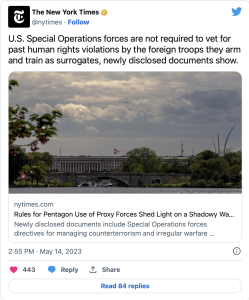Criminals welcome as US recruits foreign proxies to wage ‘irregular war’ on adversaries
The US military trains and arms foreign fighters as “proxies” to wage “irregular warfare” against adversaries, and the Pentagon does not vet them to see if they have committed atrocities, according to documents obtained by the New York Times

All Global Research articles can be read in 51 languages by activating the “Translate Website” drop down menu on the top banner of our home page (Desktop version).
To receive Global Research’s Daily Newsletter (selected articles), click here.
Visit and follow us on Instagram, Twitter and Facebook. Feel free to repost and share widely Global Research articles.
***
The United States military recruits foreign fighters to serve as “proxies” in order to wage “irregular warfare” against Washington’s adversaries, and the Pentagon does not vet them to see if they have a history of committing atrocities, according to declassified documents obtained by the New York Times.
These “surrogate” fighters are armed and trained by the Pentagon’s Special Operations Command.
They are key players in a growing number of secretive “shadow wars” that Washington is waging across the planet.
US special operations commandoes were deployed to 154 countries, or roughly 80% of the nations on Earth, as of 2020.
The Times disclosed two Pentagon programs in which “surrogate” forces are used: Section 127e, known as “127 Echo”, which gets $100 million per year to train “counterterrorism” proxies; and Section 1202, which is allotted $15 million per year to recruit proxies to wage “irregular warfare”.
This unconventional warfare is “aimed at disrupting nation-state rivals via operations that fall short of full armed conflict — including sabotage, hacking and information campaigns like propaganda”, the newspaper wrote.
The proxies recruited by the US military are vetted, but only “to detect counterintelligence risks and potential threats to American forces”, not for any “violations of human rights — such as rape, torture or extrajudicial killings”, the Times clarified.
The newspaper explained:
Proxy forces are an increasingly important part of American foreign policy. Over the past decade, the United States has increasingly relied on supporting or deputizing local partner forces in places like Niger and Somalia, moving away from deploying large numbers of American ground troops as it did in Iraq and Afghanistan.
Even as that strategic shift is meant to reduce the risk of American casualties and blowback from being seen as occupiers, training and arming local forces creates other hazards.
The Pentagon refused to tell the Times what countries these programs are active in. However, previous reports have noted that the US military ran its irregular warfare operation in Ukraine, where it trained forces for an eventual proxy war with Russia, years before Moscow’s 2022 invasion.
By its very nature, US Special Operations Command (SOCOM) has been notoriously secretive about its activities around the world.
Investigative journalist Nick Turse reported that US special operations forces were active in 154 countries in 2020, covering approximately 80 percent of the planet.
In a 2021 story in The Intercept, Turse wrote:
U.S. Special Operations Command has grown exponentially over the last 20 years. “Special operations-specific funding” topped out at $3.1 billion in 2001, compared with $13.1 billion now. Before 9/11, there were roughly 43,000 special operations forces. Today, there are 74,000 military personnel and civilians in the command. Two decades ago, an average of 2,900 commandos were deployed overseas in any given week. That number now stands at 4,500, according to SOCOM spokesperson Ken McGraw.
As the command’s global reach has grown, so has the toll on America’s commandos. While special operations forces make up just 3 percent of American military personnel, they have absorbed more than 40 percent of the casualties, mainly in conflicts across the Greater Middle East.
SOCOM’s irregular warfare campaign was previously acknowledged in reporting by Yahoo News.
“In the final month of his presidency, Donald Trump signed off on key parts of an extensive secret Pentagon campaign to conduct sabotage, propaganda and other psychological and information operations in Iran”, wrote the media outlet’s national security correspondent Zach Dorfman, in a 2021 article on Washington’s “shadow war”.
Dorfman said that Washington’s goal was “to undermine the Iranian people’s faith in their government as well as shake the regime’s sense of competence and stability”.
Former top US officials described the operation as “irregular warfare”, and it included “a 200-page package of options, involv[ing] ‘things that would cause the Iranians to doubt their control over the country’”.
Dorfman is very friendly with US spy agencies. At Yahoo News, he has also disclosed similar irregular warfare operations targeting Russia, but run by the Central Intelligence Agency.
“The CIA is overseeing a secret intensive training program in the U.S. for elite Ukrainian special operations forces and other intelligence personnel”, he revealed in a report published in January 2022 – a month before Russia invaded Ukraine.
This CIA program training Ukrainian paramilitaries in the southern United States was initiated in 2015, Dorfman disclosed.
In March 2022, a month after Moscow invaded, Yahoo News revealed that the CIA had another program training elite Ukrainian forces inside their country. That CIA initiative began in 2014.
These operations were overseen by the CIA, however. What is unique about the New York Times’ May 2023 report is that it sheds light on similar programs in which the US military arms and trains proxy forces abroad.


